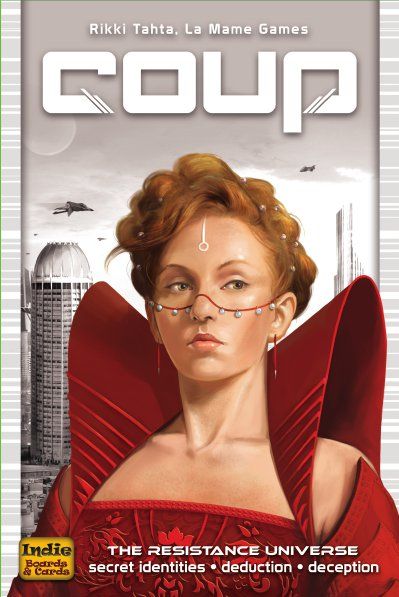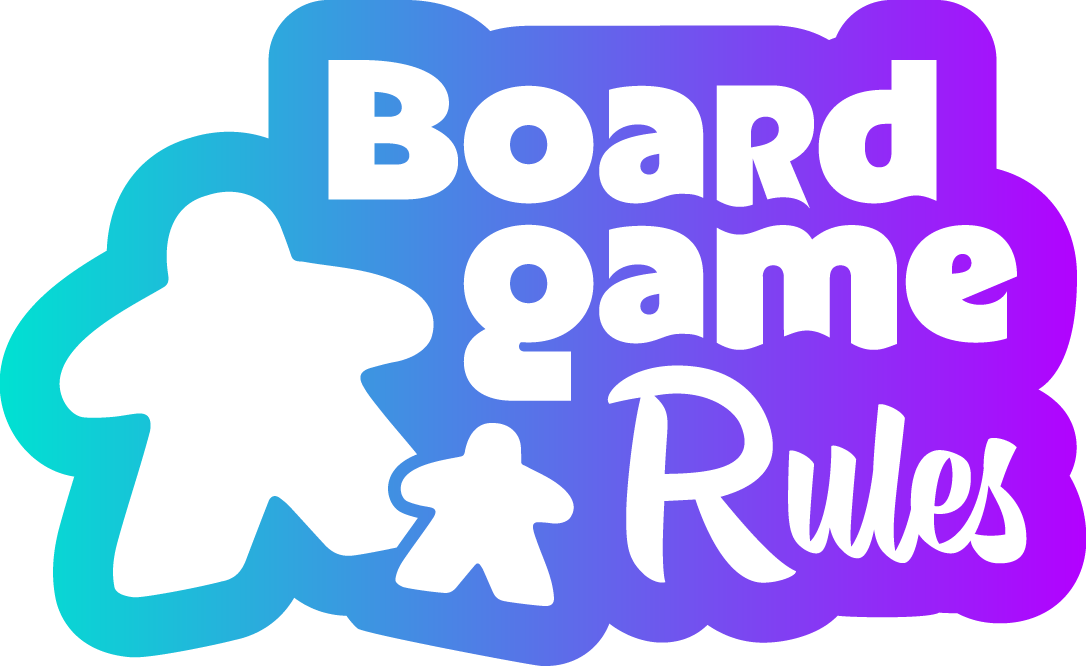Coup
2012
In Coup, players become heads of rival families in a corrupt Italian city-state, bluffing and strategizing their way to power. Last family standing wins!
15
minutes
2 - 6
player(s)
13+
Medium Light


About the game
Coup is a thrilling board game of deceit, manipulation, and power plays, set in a dystopian future where the government is run by a weak and corrupt court. With its captivating theme and unique mechanics, Coup offers an exhilarating gaming experience that will have players on the edge of their seats as they strive to outsmart their opponents and seize control.
The game’s setting is the city-state in The Resistance universe, where players take on the roles of powerful government officials. The city-state, once a hopeful beacon of democracy, has fallen into the hands of corrupt officials and ruthless power players, and it is amidst this political chaos that the game unfolds.
Read More
Setup and rules summary
Game components Unboxing the fun!
Coup is a popular strategy game with a compact set of components. The game consists of the following elements:
- 15 Character Cards: There are 3 copies of each of five different characters: Duke, Assassin, Contessa, Captain, and Ambassador. These cards represent the influence a player has within the game. Players can bluff about the identity of their cards to perform certain actions or counteractions.
- 6 Summary Cards: These cards provide a quick reference of the actions and counteractions each character can perform. They are handy for new players and as a refresher for experienced players.
- 50 Coins: These coins are the currency in the game. Players use coins to activate certain abilities and the game ends if a player cannot pay an expense.
- Rules Sheet: This sheet contains all the official rules of the game. It explains how each component interacts with the game, when and how a player can perform certain actions, and how to win the game.
In Coup, each player starts with two face-down character cards (their influences) and two coins. On their turn, they can take any action allowed by their characters’ abilities or take one of three basic actions: income (take one coin), foreign aid (take two coins), or coup (pay seven coins and force another player to lose an influence). However, any action (except for income) can be challenged or blocked by the other players, which may result in a player losing an influence. A player is out of the game when they lose both of their influences. The last player remaining wins the game.
Game setup Lay it out, line it up, let’s go
Coup is a fast-paced, bluffing board game for 2-6 players. The main objective is to be the last player standing with at least one influence (character card) left. Here’s a step-by-step guide on how to set up the game:
1. Preparing the Deck:
Start by shuffling the 15 character cards (consisting of 3 each of the Duke, Assassin, Captain, Ambassador, and Contessa) to create the deck. Place the deck face-down in the middle of the playing area.
2. Distributing Character Cards:
Deal two character cards face-down to each player. These cards represent the player’s influence and the characters they can use to perform actions. Players may look at their own cards, but must keep them hidden from others.
3. Distributing Initial Resources:
Give each player 2 coins from the game’s treasury. The treasury should be placed within easy reach of all players, who will draw from it and pay into it throughout the game.
4. Player Roles:
Each player’s role is determined by their character cards. Each character has different abilities:
- Duke: Can take three coins from the treasury (Tax) and block others from taking foreign aid.
- Assassin: Can pay three coins to try to assassinate another player’s character (Assassination).
- Captain: Can take two coins from another player (Steal) and block others from stealing coins.
- Ambassador: Can exchange cards with the deck (Exchange) and block others from stealing coins.
- Contessa: Has no action of her own but can block another player from assassinating a character.
5. Random Elements:
In Coup, the random elements come from the deck of character cards. Players do not know what characters others have, and the Ambassador action can change a player’s character cards at any time.
6. Determining the First Player:
The youngest player typically goes first. Play then proceeds clockwise around the table.
Once these steps are completed, you’re ready to start playing Coup. Remember, the key to winning is deception, so bluff wisely!
Game flow Round and round we go
Coup is a popular bluffing game for 2-6 players where the objective is to be the last player with at least one influence card left. The game consists of multiple turns with no fixed end-point, and continues until only one player remains.
The game begins with each player receiving two face-down ‘Influence’ cards and two coins. Influence cards represent the player’s influence over the court and are kept secret from the other players. These cards have specific abilities that can be used during the game.
On a player’s turn, they can perform one of the following actions:
- Income: The player takes one coin from the treasury. No other player can challenge this action.
- Foreign Aid: The player takes two coins from the treasury. However, this action can be blocked by another player with the Duke card.
- Coup: If a player has at least seven coins, they must perform a ‘Coup’ against another player. The targeted player must turn one of their Influence cards face up, thus losing that influence. A Coup cannot be challenged or blocked.
Additionally, players can perform actions associated with Influence cards, even if they do not have the respective card. However, these actions can be challenged by other players:
- Assassination (Assassin Card): The player pays three coins and chooses a player to lose an Influence. This action can be blocked by a Contessa card.
- Exchange (Ambassador Card): The player draws two cards from the Court deck and then chooses two cards to return to the deck.
- Steal (Captain Card): The player steals two coins from another player. This action can be blocked by an Ambassador or a Captain card.
- Tax (Duke Card): The player takes three coins from the treasury.
If a player’s action is challenged, the player must prove they have the necessary card. If they cannot, they lose an Influence. If they can, the challenger loses an Influence.
When a player loses an Influence, they turn one of their cards face up for all to see. If a player loses both their Influences, they are out of the game.
The last player with at least one Influence left is the winner of the game.
Players'turn One turn to rule them all
In the game of Coup, each player’s turn comprises several possible actions and strategic choices that affect gameplay. Below is a detailed breakdown:
1. Income: The player can decide to take one coin from the treasury. This action is safe, and no player can block it.
2. Foreign Aid: The player may opt to take two coins from the treasury. However, this action can be blocked by another player who claims to have the Duke.
3. Coup: If a player has accumulated at least seven coins, they can carry out a coup against another player. The targeted player must turn over an influence card. This action is unblockable.
4. Taxes: A player may claim to have the Duke and take three coins from the treasury. This action can be challenged if another player believes the claim is false.
5. Assassinate: By claiming to have the Assassin and paying three coins, a player can force another player to turn over an influence card. This action can be blocked by a player claiming to have the Contessa. It can also be challenged if a player doesn’t believe the assassin claim.
6. Exchange: A player claiming to have the Ambassador can exchange cards with the Court deck. The player takes two cards from the deck, chooses which (if any) to exchange with their face-down cards, then returns two cards to the deck. This action can be challenged but cannot be blocked.
7. Steal: A player claiming to have the Captain can steal two coins from another player. This action can be blocked by another player claiming to have the Ambassador or the Captain. It can also be challenged if a player doesn’t believe the Captain claim.
Strategically, the key to Coup is deceiving other players about the cards you hold while trying to deduce which cards they have. Players must balance the risks and rewards of each action and counteraction, deciding when to challenge, when to bluff, and when to tell the truth. The game continues until only one player has any influence cards left, making them the winner.
End of the game All good games must come to an end
The game of Coup is all about deception and manipulation. It ends when only one player is left standing, that is, when only one player has any influence left in the form of face-down character cards. The last player standing is declared the winner.
Victory Conditions:
The victory conditions for Coup are straightforward. The game doesn’t involve any scoring system. The winner is determined solely based on who can outlast their opponents. The victory conditions are as follows:
- Survival: If a player is the last one standing, meaning all other players have lost their influence, the surviving player wins the game.
- Forfeiture: If a player chooses to quit or is forced to leave the game for any reason, they lose their influence and are removed from the game. The last player remaining with any influence wins.
End Game Actions:
Before declaring the winner, players must perform the following actions:
- Revealing Influence: Once a player loses or discards their last influence, they must reveal their face-down character cards. This action indicates that they’re out of the game.
- Final Challenge: If there are only two players left, an unsuccessful challenge to an action can result in immediate loss, as the player will lose their last influence. If a player suspects their opponent’s action is a bluff, they can challenge. But if the challenge is incorrect, they will lose the game.
In a nutshell, the game of Coup is a battle of wits and deception where the last player standing is victorious. Players must carefully navigate through the game, managing their influence and successfully bluffing their way to victory.
Scoring Did you outsmart your rivals?
In the game of ‘Coup’, scoring is not based on a point system but rather on the ability of players to maintain influence over their two cards, which represent the player’s influence on the court. The game continues until only one player retains their influence. Here’s a detailed explanation:
The Concept of Influence: Each player starts the game with two influence, represented by two face-down character cards from a deck. The goal of the game is to eliminate your opponents’ influence so that you are the last player with any influence in the game.
Eliminating Influence: A player loses an influence when they are the target of a successful coup or assassination, or if they lose a challenge. When this happens, the player must flip one of their face-down cards face up, revealing the character and removing that card from play.
Challenges: If a player believes a rival is lying about the character they are playing, they can challenge the rival. If the challenged player cannot reveal the character they claimed to have, they lose an influence. If they can reveal that character, the challenger loses an influence.
Actions and Counteractions: Players can perform actions or counteractions during their turn, many of which are associated with a character. If a player claims a character’s action or counteraction and no other player challenges them, they successfully perform the action or counteraction.
Winning the Game: The last player with any remaining influence wins the game. There are no points to calculate or compare; the game is purely about outlasting your opponents through careful strategy, bluffing, and deception.
Tie-breaking Rules: In ‘Coup’, there are no tie-breaking rules because there cannot be a tie. The game continues until only one player retains any influence. If a situation arises where multiple players lose their last influence simultaneously, the game ends in a draw.
Particular Cases and Exceptions Wait… is that legal?
The board game Coup is a game of deceit and manipulation, where players must bluff and betray their way to victory. While the basic rules are straightforward, there are some special rules, exceptions, and clarifications that can add complexity to the game.
1. Action Challenge: Any player can challenge another player’s action by claiming that they do not believe the player has the character card they are pretending to be. If the challenged player cannot reveal the appropriate card, they lose an influence. If they can, the challenger loses an influence.
2. Counteraction Challenge: Similar to the action challenge, a player can challenge another player’s counteraction. The same rules apply – if the challenged player cannot reveal the character card they need, they lose an influence. If they can, the challenger loses an influence.
3. Double Contessa Rule: A player cannot use a Contessa to block an assassination if they have previously used a Contessa to block an assassination and have not proven they have a Contessa. This rule is to prevent a player from indefinitely blocking assassinations with a single, unproven Contessa.
4. Card Replacement: When a player loses an influence, they choose one of their face-down cards to reveal. This card is out of play for the rest of the game. However, if a player successfully defends against a challenge, they return their revealed card to the deck, shuffle it, and draw a new card. This ensures they are not at a disadvantage for the rest of the game.
5. Duke and Foreign Aid: A player cannot claim to have a Duke to block foreign aid if they have not proven they have a Duke. This prevents a player from blocking foreign aid indefinitely with an unproven Duke.
6. The Last Draw: If the draw deck is empty, the game continues until a player needs to draw a card – at that point, the game ends immediately.
Note: The game’s creator recommends using a poker face and bluffing as strategies. The game is designed to reward deception and manipulation, so players should not feel bound by honesty.
Tips and tricks Play smarter, not harder!
Advanced Strategies for ‘Coup’
1. Information Management: Keep track of the cards that have been revealed and make an educated guess about the cards that are still in play. This will help you make strategic decisions.
2. Bluffing: A good strategy is to claim roles that you don’t actually have. This can confuse your opponents and make them waste their challenges. However, be careful not to be caught in a lie.
3. Managing your influence: Try to keep both your cards for as long as possible. Losing one card early in the game can put you at a significant disadvantage.
Beginner Tips for ‘Coup’
1. Understanding the roles: Each role has its own unique abilities. Make sure to understand what each role can do before you start playing.
2. Be observant: Pay attention to the actions of other players. This can give you clues about the cards they might have.
3. Don’t be afraid to challenge: If you suspect that a player is lying about their role, don’t hesitate to challenge them. Even if you’re wrong, you’ll gain valuable information.
Common Mistakes to Avoid in ‘Coup’
1. Being too passive: If you don’t take the initiative and make bold moves, you’ll be an easy target for other players.
2. Not keeping track of revealed cards: If you don’t keep track of the roles that have been revealed, you’ll have a hard time guessing the roles of the remaining cards.
3. Not bluffing: While it’s risky, bluffing is a crucial part of ‘Coup’. If you never lie about your roles, you’ll be too predictable.
Ways to Optimize Gameplay in ‘Coup’
1. Practice: The more you play ‘Coup’, the better you’ll become at it. Practice makes perfect!
2. Adapt your strategy: Don’t stick to the same strategy every game. Adapt your moves based on the cards you have and the actions of other players.
3. Play with different people: Playing with the same people can make the game predictable. Try playing with different people to make the game more challenging and fun.
